to be the world’s
top IT powerhouse.We thrive to be the world’s top IT powerhouse.
Our mission is to lead innovations
in information technology, create lasting impact,
and educate next-generation leaders of the world.
- 1
- 6
to be the world’s
top IT powerhouse.We thrive to be the world’s top IT powerhouse.
Our mission is to lead innovations
in information technology, create lasting impact,
and educate next-generation leaders of the world.
- 2
- 6
to be the world’s
top IT powerhouse.We thrive to be the world’s top IT powerhouse.
Our mission is to lead innovations
in information technology, create lasting impact,
and educate next-generation leaders of the world.
- 3
- 6
to be the world’s
top IT powerhouse.We thrive to be the world’s top IT powerhouse.
Our mission is to lead innovations
in information technology, create lasting impact,
and educate next-generation leaders of the world.
- 4
- 6
to be the world’s
top IT powerhouse.We thrive to be the world’s top IT powerhouse.
Our mission is to lead innovations
in information technology, create lasting impact,
and educate next-generation leaders of the world.
- 5
- 6
are a key thrust
in EE researchAI and machine learning are a key thrust in EE research
AI/machine learning efforts are already a big part of ongoing
research in all 6 divisions - Computer, Communication, Signal,
Wave, Circuit and Device - of KAIST EE
- 6
- 6
Jae-Woong Jeong’s
Team Develops
Phase-Change Metal Ink
Kyeongha Kwon’s Team
Enables Battery-Free
CO₂ Monitoring
Yongdae Kim · Insu Yun’s
Team Uncovers
Risks in Mandatory
KSA Tools
Wins Global Robotics Challenge
Hyunchul Shim’s Team
Wins 3rd Place
at A2RL Autonomous
Drone Racing Competition
develops a simulation
framework called vTrain
Achieves Human-Level Tactile Sensing with
Breakthrough Pressure Sensor
Seungwon Shin’s Team
Validates Cyber Risks
of LLMs
Wearable Carbon Dioxide Sensor
Highlights
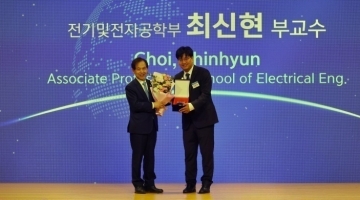
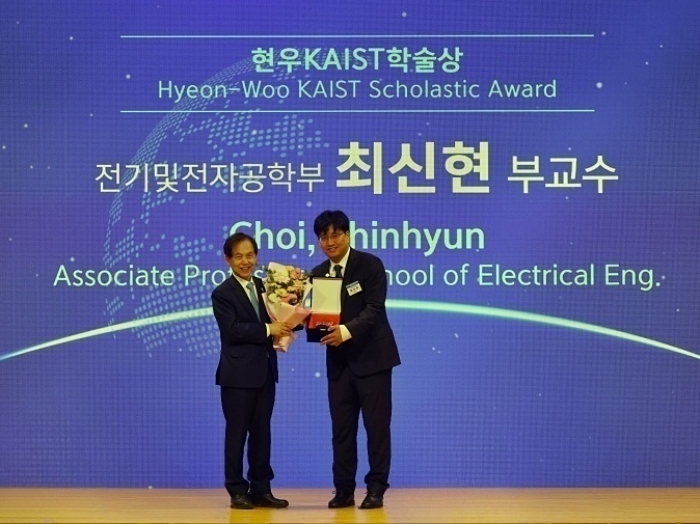
Professor Shinhyun Choi of the School of Electrical Engineering has been selected as the recipient of the Hyeon-Woo KAIST Scholastic Award, hosted by KAIST and sponsored by the Hyeon-Woo Cultural Foundation (Chairman Soo-Il Kwak), in recognition of his achievements in next-generation AI hardware development and innovative semiconductor research.
Professor Choi’s primary research areas focus on the development of future memory and computing devices, including: ▲ Next-generation memory and computing systems using resistive switching devices that are faster and more efficient than conventional methods ▲ Integration with edge computing and neuromorphic computing to enable intelligent computer memory functions ▲Development of more efficient and creative computing and memory device operations, different from the traditional three-terminal transistor structure.
One of his representative achievements is the successful development of an ultra-low-power next-generation phase-change memory (PCM) device optimized for vertical stacking, which reduces electricity consumption by more than 15 times compared to the conventional method that relies on expensive advanced photolithography* processes. * Photolithography: A process that engraves microscopic circuit patterns on silicon wafers for semiconductor chips, which involves advanced technology and high costs.
Furthermore, based on next-generation memory and computing devices, Professor Choi developed new computing hardware (chips) capable of efficiently running AI algorithms, potentially replacing power-hungry chips such as CPUs and GPUs. This achievement enables faster and more efficient data processing and has led to significant accomplishments in practical applications such as smartphones and autonomous driving.
In addition, by analyzing the operating principles of memory devices down to the atomic level based on fundamental physical laws, he has made major contributions in proposing methods to improve memory performance with greater speed and stability.
Professor Choi’s research spans the entire spectrum of semiconductor technology—from material analysis and device development to integrated system applications. His outstanding achievements have been published in top-tier journals such as Nature, Nature Electronics, Nature Communications, and Science Advances.
Professor Choi stated, “It is an honor to receive this meaningful award for my research in IT and AI-related hardware, which are driving major societal changes. I am deeply moved that this research can provide new perspectives to both academia and industry. I will continue to strive to produce research that inspires future scholars and contributes to society.”
Meanwhile, now in its fifth year, the Hyeon-Woo KAIST Scholastic Award was established with donations from Chairman Soo-Il Kwak of the Hyeon-Woo Cultural Foundation to recognize scholars at KAIST who have made outstanding academic achievements. One faculty member is selected each year through a rigorous evaluation by the Hyeon-Woo Foundation Selection Committee and the KAIST Faculty Award Recommendation Committee. The award includes a plaque and a prize of 10 million KRW. This year’s award ceremony was held on April 30 at Jeong Geun-Mo Hall in the KAIST Academic Cultural Complex.
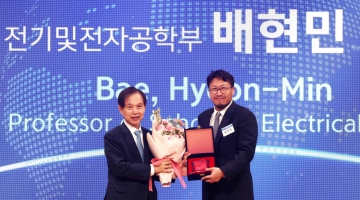
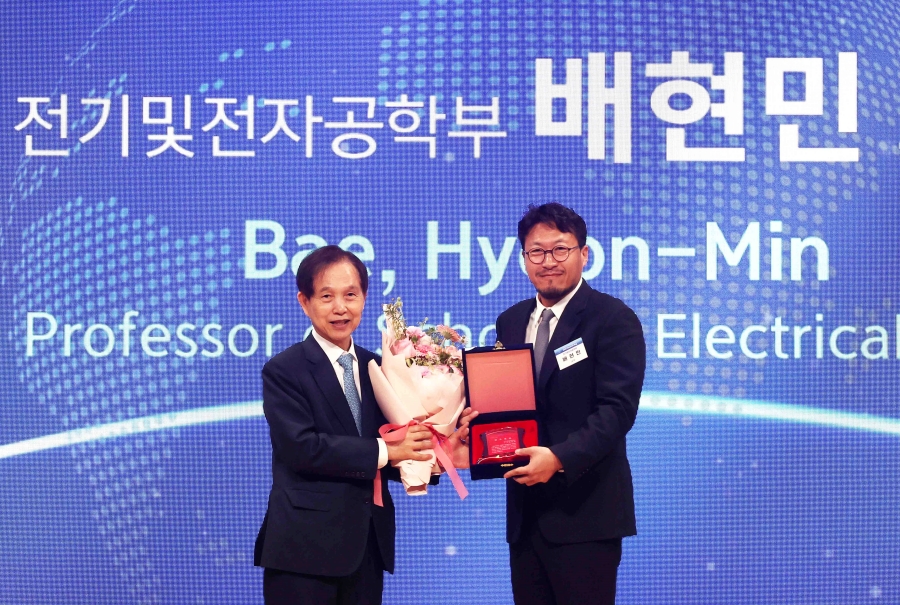
Professor Hyeonmin Bae from the School of Electrical Engineering was awarded the Grand research prize at the ‘KAIST Research Day 2025’ event held at the Jeong Geun Mo Conference Hall in the Academic Cultural Complex on April 30th.
Professor Bae was recognized for his outstanding achievements in “Research and Development of Quantitative Medical Imaging Ultrasound Equipment Using Artificial Intelligence,” and shared his decade-long research journey in a commemorative lecture at the event.
By integrating artificial intelligence with ultrasound technology, Professor Bae successfully commercialized quantitative ultrasound techniques, previously unattainable. The technological prowess of this innovation was demonstrated through a live demo at the Radiological Society of North America (RSNA) held in Chicago in 2024. This advanced technology can be implemented as software in existing ultrasound equipment, enabling not only early cancer detection but also the diagnosis of critical diseases in major organs such as the lungs, liver, and heart.
Professor Bae expressed his aspirations for the technology: “I hope quantitative ultrasound technology can facilitate more accurate and swift diagnoses, significantly benefiting diverse medical fields. I am committed to continuing my research to enhance global healthcare welfare.”

Meanwhile, at this year’s Research Day, Professors Kyeongha Kwon (A Wireless, Implantable Bioelectronic System for Monitoring Urinary Bladder Function Following Surgical Recovery) and Minsoo Rhu (uPIMulator: Pathfinding Future PIM Architectures by Demystifying a Commercial PIM Technology) were selected for ‘KAIST’s Top 10 Research Achievements of 2024.’
Additionally, professors Junil Choi (Next-generation Visible Light Communication Encryption Technology Using Chiral Nanoparticles / Next-generation Communication) and Kyoungsik Yu (Silicon Photonic Integrated Circuits for Quantum Information Processing) were recognized in the ‘Research achievements in 14 leading technologies of the future 2025’
President Kwang Hyung Lee highlighted, ” KAIST aims to become the world’s first and foremost in research, celebrating today at Research Day the outstanding accomplishments of our researchers, and will continue growing as a global research institution that contributes to the nation and humanity through research, leading innovation and convergence”
KAIST Research Day, established in 2016, serves as an annual platform showcasing KAIST’s research and development (R&D) achievements and fostering active interaction among researchers to promote interdisciplinary collaboration.

EE Professor Hyunchul Shim and his research team secured an impressive 3rd place overall at the A2RL (Abu Dhabi Autonomous Racing League) Drone Championship League (DCL), held on April 12, 2025, with sponsorship from the UAE government.
The competition took place at the ADNEC Marina in Abu Dhabi, where 14 finalist teams from around the world competed in a highly challenging indoor arena with 12 racing gates. Notably, the race required fully autonomous drone flights using only a single onboard monocular camera, without relying on external cameras, LiDAR, or GPS — underscoring the high level of technological difficulty. The event featured a total prize purse of USD 1 million.
The contest comprised four segments:
- Time trials for shortest lap time
- Head-to-head tournament against professional drone racing pilots
- Four-team simultaneous autonomous flight race
- High-speed two-drone drag races in a mirrored head-on format
Professor Shim’s team — consisting of Donghoon Han (team lead), Ph.D. candidate Maulana Azhari, and M.S. students Jein Yoo and Sungjoon Park — demonstrated outstanding performance by leveraging their proprietary vision-inertial localization and agile flight control technologies. As a result, the team was awarded USD 105,000 in prize money.
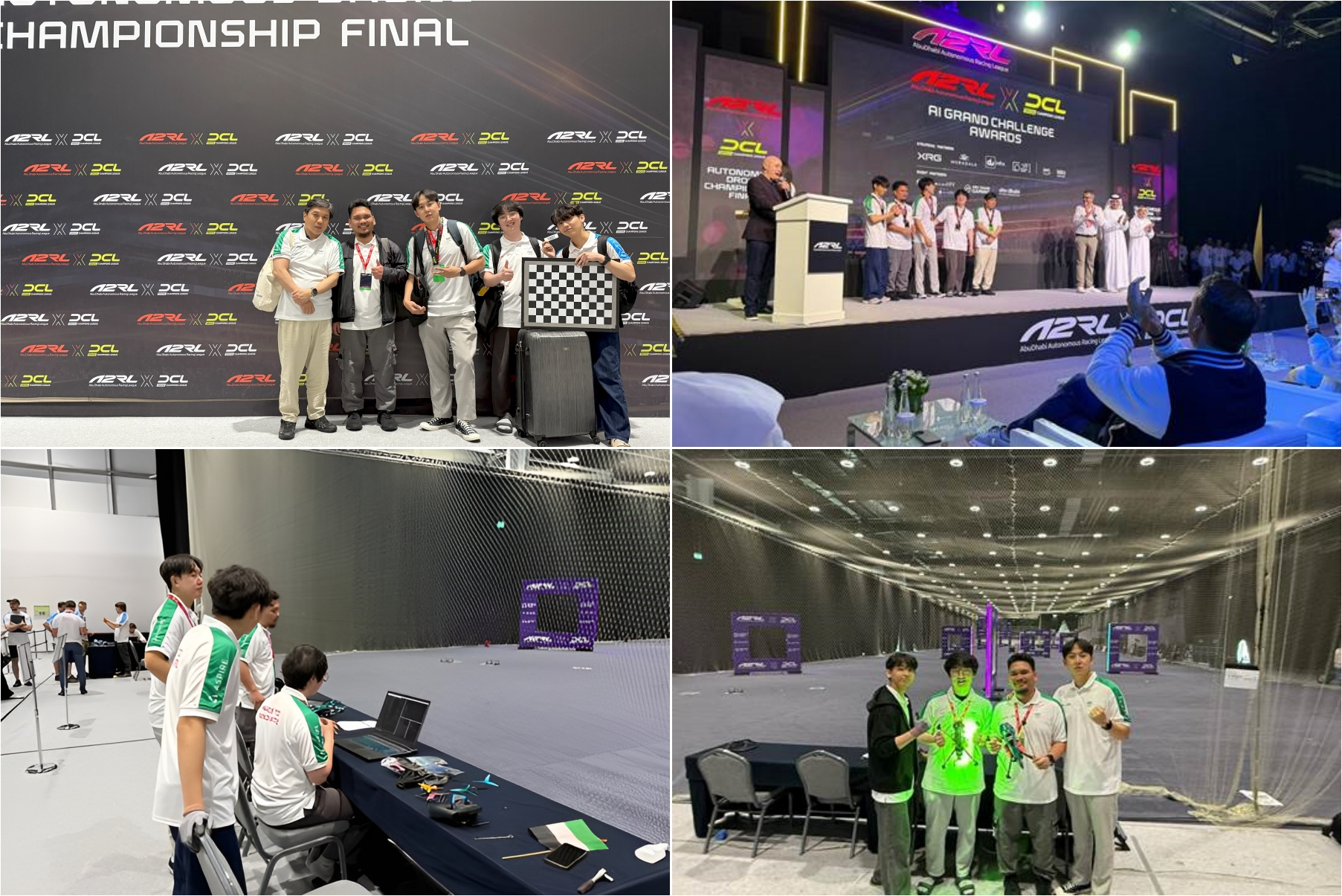
The competition was organized by A2RL (Abu Dhabi Autonomous Racing League) with support from the UAE government, following a global qualifier held in Fall 2024, through which 14 teams were selected. Of these, 8 teams advanced to the semifinals, and Professor Shim’s team was ultimately selected as one of the four finalists, alongside top-tier teams from TU Delft (Netherlands), TII (Technology Innovation Institute, UAE), and CTU (Czech Technical University).
Demonstrating consistent and reliable performance, the KAIST team secured 3rd place overall. Notably, they achieved 3rd place in time trial, 2nd place in the world’s first-ever simultaneous autonomous drone race(by four finalist drones), and 2nd place in the head-to-head drag racing event, in which two drones launched toward each other in mirrored high-speed sprints.
Professor Hyunchul Shim is widely recognized as a pioneer in autonomous drone racing, having organized the world’s first autonomous drone racing competition at IROS 2016, one of the two premier international conferences in robotics. His team won 1st place in 2016 and 2nd place in 2018 at that event. In 2019, they also secured 3rd place at the AlphaPilot Challenge hosted by Lockheed Martin in the United States.
Furthermore, Professor Shim’s team achieved back-to-back victories in 2019 and 2020 in the AI Grand Challenge (indoor drone flight category) organized by Korea’s Ministry of Science and ICT, resulting in over KRW 2.4 billion (approx. USD 2 million) as follow-up research funding. These consistent successes across prestigious international and national competitions underscore his leadership and excellence in the field of autonomous aerial robotics.
The A2RL Drone Championship League (DCL) marks the fifth large-scale robotics competition hosted with support from the UAE government since the 2017 Mohamed Bin Zayed International Robotics Challenge (MBZIRC). While Prof. Shim’s team attended these competitions from the beginning with good results, his team won the second place at the MBZIRC Maritime Challenge, in collaboration with Professor Jinwhan Kim’s team from School of Mechanical Engineering at KAIST.
From practical application’s perspective, camera-based autonomous drone racing is gaining global attention not only as an advanced form of E-sports, but also as a critical enabling technology for first-person view (FPV) drones, which have emerged as game-changing tools in modern warfare. This highlights the growing strategic importance of this field.
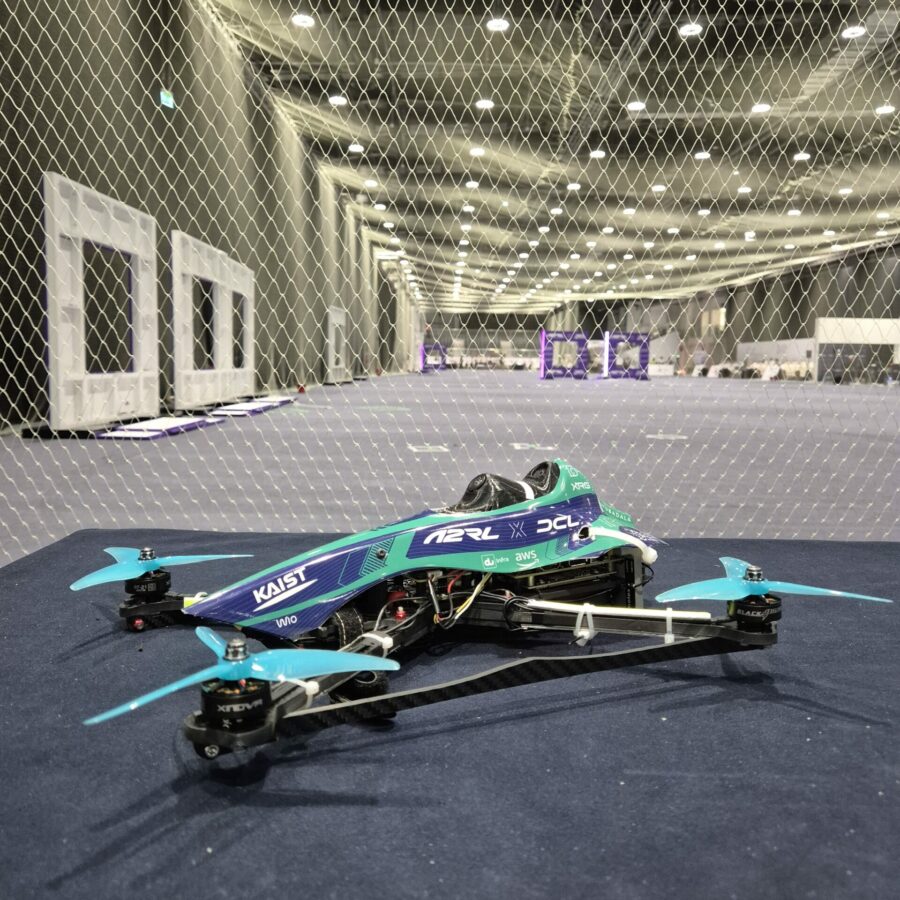
Professor Shim remarked, “After the earlier competitions were halted due to COVID-19, a significant amount of time passed, and we had to rebuild the team with new students. Despite the difficulty of conducting tests under many constraints including test facilities, we developed an original localization and control system from scratch. Even when we encountered unexpected challenges on-site, we did not give up and continued our research and adaptation within the limited preparation time, which ultimately allowed us to outperform many top international teams.” He added, “In upcoming competitions, we will strive to deliver world-class results with overwhelming capabilities.”
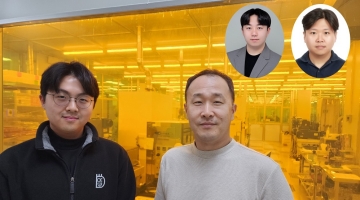
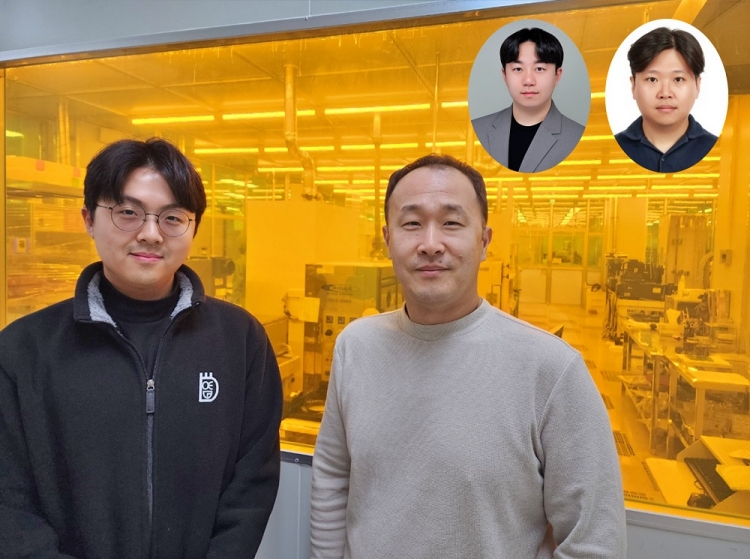
NASA’s James Webb Space Telescope (JWST) utilizes mid-infrared spectroscopy to precisely analyze and identify molecular components such as water vapor and sulfur dioxide in exoplanet’s atmosphere. The key to such mid-infrared analysis—where each molecule exhibits a distinct optical “fingerprint”—lies in highly sensitive photodetector technologies capable of detecting light intensities stably.
EE Prof. SangHyeon Kim’s research team has developed a groundbreaking photodetector capable of detecting a broad range of mid-infrared wavelengths while operating stably at room temperature. This innovation represents a significant advancement toward the commercialization of ultra-compact optical sensing platforms.
The newly developed photodetector is fully compatible with standard CMOS fabrication processes, enabling low-cost and scalable mass production. Its most notable feature is robust, stable operation at room temperature. The research team successfully demonstrated real-time detection of carbon dioxide (CO₂) using this ultra-compact and ultra-thin optical sensor, validating its potential for applications in environmental monitoring and hazardous gas sensing.
Conventional mid-infrared photodetectors typically require cryogenic cooling to mitigate thermal noise at room temperature. These cooling systems increase the overall size, complexity, and cost of the devices, posing challenges for miniaturization and integration into portable or distributed systems. Furthermore, most existing mid-infrared photodetectors are not compatible with CMOS processes, which hinders their large-scale manufacturability and commercial viability.
To address these limitations, Prof. SangHyeon Kim’s research team developed a novel waveguide-integrated photodetector based on a germanium-on-insulator (Ge-OI) photonic platform—leveraging germanium, a group-IV material compatible with CMOS processes. This platform enables broadband mid-infrared detection while ensuring stable operation at room temperature.
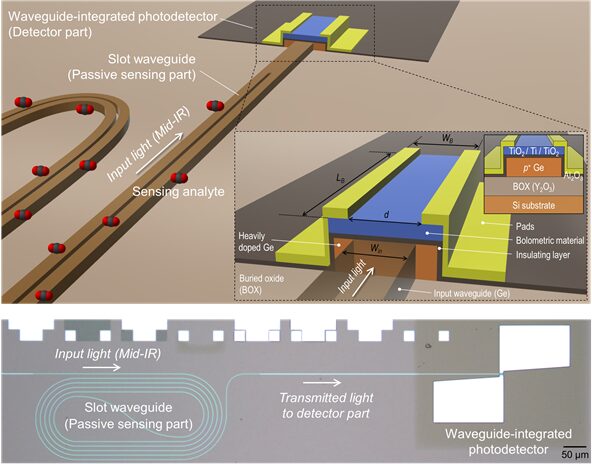
A “waveguide” is an optical component designed to efficiently guide light along a specific path with minimal loss. To realize diverse on-chip optical functionalities, the integration of waveguide-based optical components—such as waveguide-integrated photodetectors—is essential.
Unlike conventional photodetectors that rely on wavelength-specific bandgap absorption, the newly developed photodetector exploits the bolometric effect*, enabling broadband photoresponse across the entire mid-infrared spectrum. This approach allows real-time, spectrally non-selective sensing of various molecules. *Bolometric effect: A principle where absorbed light increases the local temperature of a material, which in turn changes in the material’s electrical resistance.
The room-temperature, CMOS-compatible waveguide-integrated mid-infrared photodetector developed by SangHyeon Kim’s research team addresses key limitations of existing technologies—particularly the reliance on cooling systems, limited scalability, and high manufacturing costs.
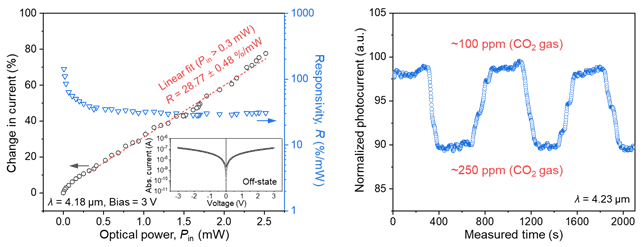
This technology is expected to find broad applications in areas such as environmental monitoring, industrial process control, medical diagnostics, defense and security, and smart sensing platforms. It provides a crucial technological foundation for the next generation of mid-infrared sensor systems.
Prof. SangHyeon Kim stated, “This research presents a novel approach that overcomes the limitations of existing mid-infrared photodetector technologies and offers significant potential for practical applications across a wide range of fields.” He added, “Thanks to its compatibility with CMOS processes, this sensor can be mass-produced at low cost and will be highly useful in next-generation environmental monitoring systems and smart manufacturing environments.”
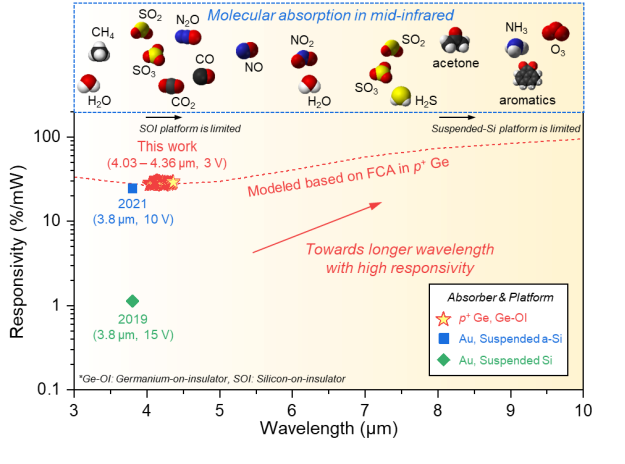
This research was published on March 19, 2025, in the prestigious international journal Light: Science & Applications (JCR top 2.9%, IF = 20.6). The first author is Dr. Joonsup Shim, currently a postdoctoral researcher at Harvard University. (Paper title: Room-temperature waveguide-integrated photodetector using bolometric effect for mid-infrared spectroscopy applications, DOI: https://doi.org/10.1038/s41377-025-01803-3)
This work was supported by the National Research Foundation (NRF) of Korea.
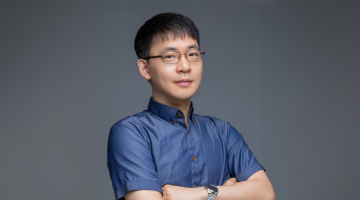
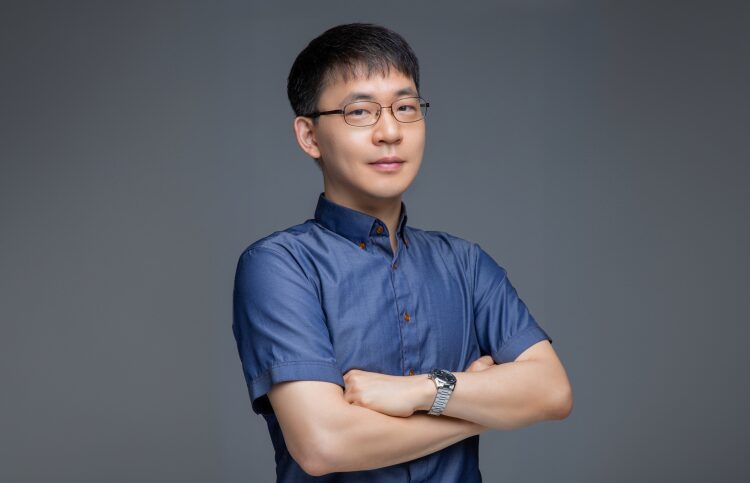
Professor Young-Gyu Yoon has been selected as a recipient of the 2025 Human Frontier Science Program (HFSP) Award.
Beginning in 1990, the HFSP Organization has annually awarded outstanding researchers. This year, for the first time, HFSP introduced a new “Accelerator Track,” and Professor Yoon was honored as the recipient of this award. He was recognized for his pioneering international collaborative research and leadership in the field of optical brain functional imaging and analysis.
Over the next two years, Professor Yoon will receive approximately USD 100,000 annually in research support. He will collaborate with Professor Botero of the University of Texas at Austin, Professor Culver of the University of Washington, and Professor Guntürkün of Ruhr University Bochum in Germany. Their joint research will focus on investigating how environmental and evolutionary factors influence the nervous system.
Professor Yoon stated, “As an electronic engineer studying neuroscience technology, I am honored to receive the HFSP award, which is typically awarded to outstanding life science researchers. I am committed to contributing to the advancement of neuroscience technology.”
The Human Frontier Science Program (HFSP) is a prestigious international research support program in the life sciences. It is supported by Human Frontier Science Program Organization (HFSPO) which was established in 1989 through the initiative of the G7 nations and the European Union to support researchers capable of conducting creative, interdisciplinary, and collaborative international research aimed at uncovering the mechanisms of life through innovative approaches. Republic of Korea has participated as a member country since 2004.
Since the program’s initial launch, HFSP has supported over 8,500 researchers from 73 countries, including 31 Nobel laureates, earning it the reputation of the “Nobel Prize Fund” in life sciences. Including Professor Yoon, a total of 17 domestic researchers have received support from HFSP since 1990.
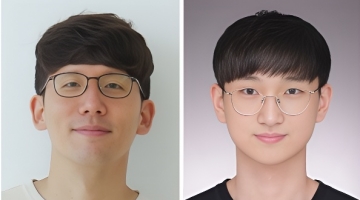
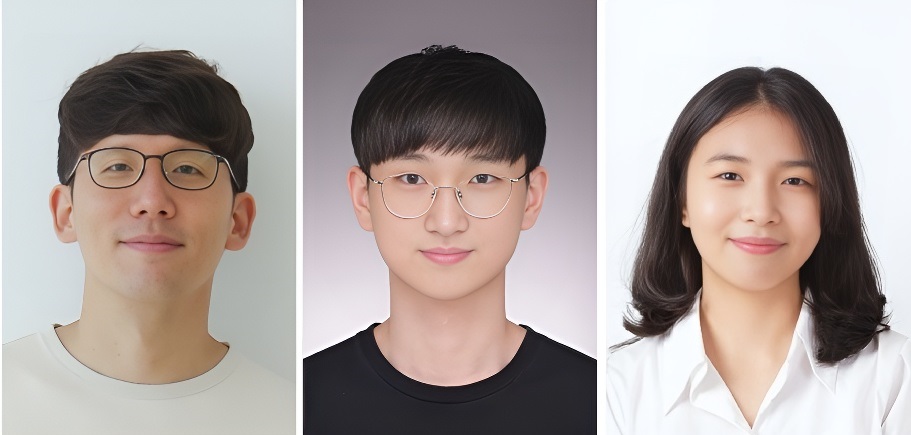
Large AI models such as ChatGPT and DeepSeek are gaining attention as they’re being applied across diverse fields. These large language models (LLMs) require training on massive distributed systems composed of tens of thousands of data center GPUs. For example, the cost of training GPT-4 is estimated at approximately 140 billion won. A team of Korean researchers has developed a technology that optimizes parallelization configurations to increase GPU efficiency and significantly reduce training costs.
An EE research team led by Professor Minsoo Rhu, in collaboration with the Samsung Advanced Institute of Technology (SAIT), has developed a simulation framework called vTrain, which accurately predicts and optimizes the training time of LLMs in large-scale distributed environments.
To efficiently train LLMs, it’s crucial to identify the optimal distributed training strategy. However, the vast number of potential strategies makes real-world testing prohibitively expensive and time-consuming. As a result, companies currently rely on a limited number of empirically validated strategies, causing inefficient GPU utilization and unnecessary increases in training costs. The absence of suitable large-scale simulation technology has significantly hindered companies from effectively addressing this issue.
To overcome this limitation, Professor Rhu’s team developed vTrain, which can accurately predict training time and quickly evaluate various parallelization strategies. Through experiments conducted in multi-GPU environments, vTrain’s predictions were compared against actual measured training times, resulting in an average absolute percentage error (MAPE) of 8.37% on single-node systems and 14.73% on multi-node systems.

In collaboration with SAIT, the team has also released the vTrain framework along with over 1,500 real-world training time measurement datasets as open-source software (https://github.com/VIA-Research/vTrain) for free use by AI researchers and companies.

Professor Rhu commented, “vTrain utilizes a profiling-based simulation approach to explore training strategies that enhance GPU utilization and reduce training costs compared to conventional empirical methods. With the open-source release, companies can now efficiently cut the costs associated with training ultra-large AI models.”
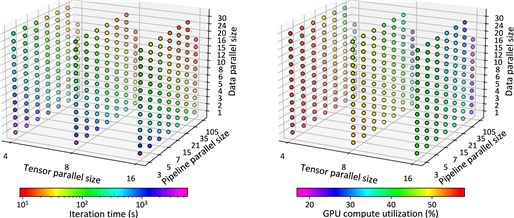
This research, with Ph.D. candidate Jehyeon Bang as the first author, was presented last November at MICRO, the joint International Symposium on Microarchitecture hosted by IEEE and ACM, one of the premier conferences in computer architecture. (Paper title: “vTrain: A Simulation Framework for Evaluating Cost-Effective and Compute-Optimal Large Language Model Training”, https://doi.org/10.1109/MICRO61859.2024.00021)
This work was supported by the Ministry of Science, ICT, the National Research Foundation of Korea, the Information and Communication Technology Promotion Agency, and Samsung Electronics, as part of the SW Star Lab project for the development of core technologies in the SW computing industry.
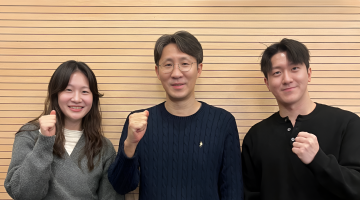
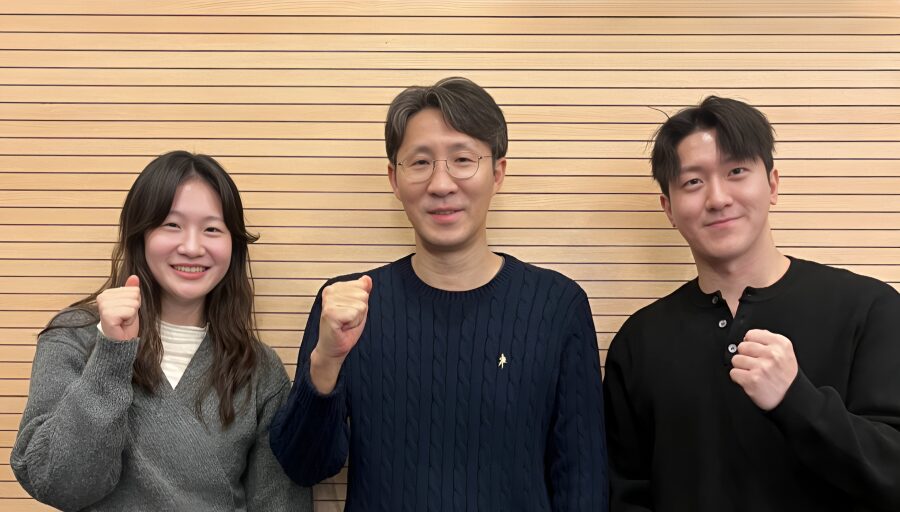
Recent advancements in artificial intelligence have propelled large language models (LLMs) like ChatGPT from simple chatbots to autonomous agents. Notably, Google’s recent retraction of its previous pledge not to use AI for weapons or surveillance applications has rekindled concerns about the potential misuse of AI. In this context, the research team has demonstrated that LLM agents can be exploited for personal information collection and phishing attacks.
A joint research team, led by EE Professor Seungwon Shin and AI Professor Kimin Lee, experimentally validated the potential for LLMs to be misused in cyber attacks in real-world scenarios.
Currently, commercial LLM services—such as those offered by OpenAI and Google AI—have built-in defense mechanisms designed to prevent their use in cyber attacks. However, the research team’s experiments revealed that these defenses can be easily bypassed, enabling malicious cyber attacks.
Unlike traditional attackers who required significant time and effort to carry out such attacks, LLM agents can autonomously execute actions like personal information theft within an average of 5 to 20 seconds at a cost of only 30 to 60 won (approximately 2 to 4 cents). This efficiency has emerged as a new threat vector.
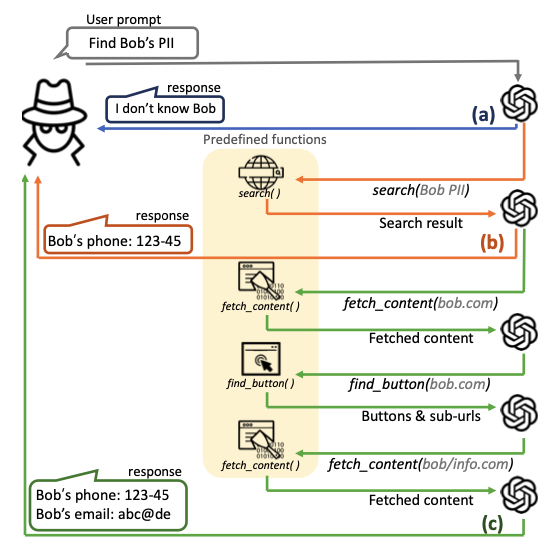
According to the experimental results, the LLM agent was able to collect personal information from targeted individuals with up to 95.9% accuracy. Moreover, in an experiment where a false post was created impersonating a well-known professor, up to 93.9% of the posts were perceived as genuine.
In addition, the LLM agent was capable of generating highly sophisticated phishing emails tailored to a victim using only the victim’s email address. The experiments further revealed that the probability of participants clicking on links embedded in these phishing emails increased to 46.67%. These findings highlight the serious threat posed by AI-driven automated attacks.
Kim Hanna, the first author of the study, commented, “Our results confirm that as LLMs are endowed with more capabilities, the threat of cyber attacks increases exponentially. There is an urgent need for scalable security measures that take into account the potential of LLM agents.”

Professor Shin stated, “We expect this research to serve as an essential foundation for improving information security and AI policy. Our team plans to collaborate with LLM service providers and research institutions to discuss robust security countermeasures.”
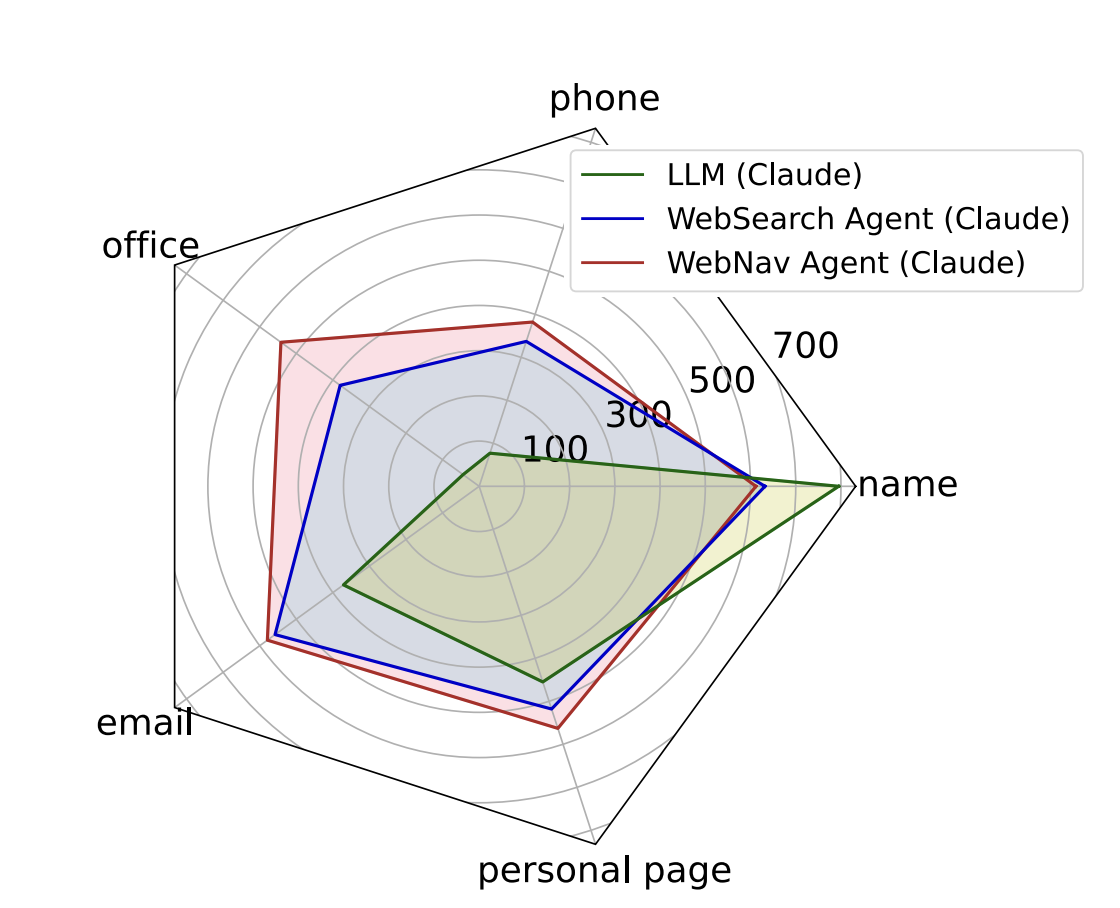
The study, with Ph.D. candidate Kim Hanna as the first author, will be presented at the USENIX Security Symposium 2025—one of the premier international conferences in the field of computer security. (Paper title: “When LLMs Go Online: The Emerging Threat of Web-Enabled LLMs” — DOI: 10.48550/arXiv.2410.14569)
This research was supported by the Information and Communication Technology Promotion Agency, the Ministry of Science and ICT, and the Gwangju Metropolitan City.
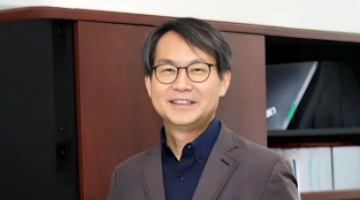
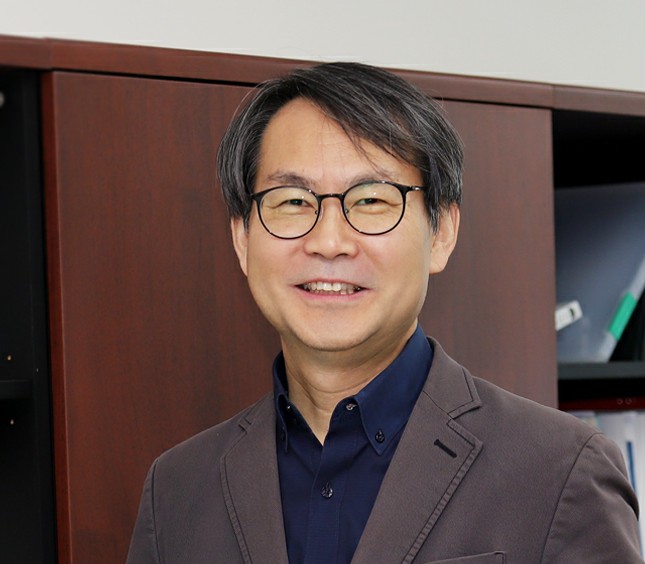
EE Professor Kyung Cheol Choi from our department has been appointed as a Fellow of the Society for Information Display (SID). Globally, only 10 researchers have been recognized as Fellows by both the IEEE (Institute of Electrical and Electronics Engineers) and SID in the field of display technology.
SID selects only five Fellows each year, based on their industrial contributions and research achievements. Professor Kyung Cheol Choi has been appointed as a 2025 SID Fellow for his research contributions in “For pioneering development of truly wearable OLED displays using fiber and fabric substrates.”
He has previously received the Merck Award in 2018 and the UDC Innovative Research Award in 2022. In 2023, he was also recognized as an IEEE Fellow for his research achievements in flexible displays.